Charles Mackerras - Janácek: From the House of the Dead (1991)
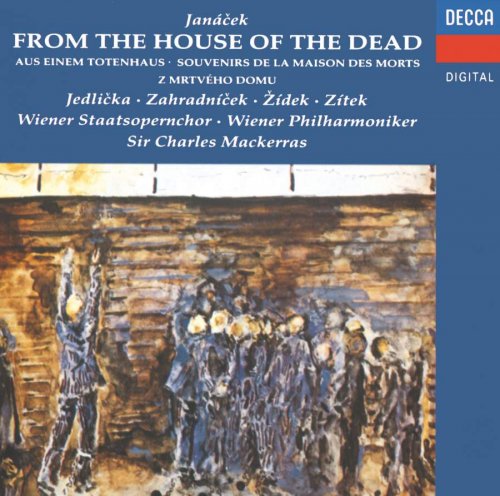
Artist: Dalibor Jedlicka, Vienna Philharmonic Orchestra, Sir Charles Mackerras
Title: Janácek: From the House of the Dead
Year Of Release: 1991
Label: Decca
Genre: Classical
Quality: FLAC (image + .cue, log, artwork)
Total Time: 02:02:40
Total Size: 643 MB
WebSite: Album Preview
Tracklist:Title: Janácek: From the House of the Dead
Year Of Release: 1991
Label: Decca
Genre: Classical
Quality: FLAC (image + .cue, log, artwork)
Total Time: 02:02:40
Total Size: 643 MB
WebSite: Album Preview
CD 1
Act One
1-1 Prelude 5:31
1-2 Přvedou Dnes Pána! 4:15
1-3 Jak Tě Nazý Vají? 5:22
1-4 Neuvidí Oko Již Těch Krajů 4:56
1-5 Aljejo, Podávej, Nitku! 7:06
Act Two
1-6 A... A... 4:16
1-7 Alexandr Petrovič, Bude Prazdnik 7:52
1-8 Přešel Den, Druhý, Třetí 2:52
1-9 Dnes Bude Můj Posledni Den! 5:18
1-10 Pantomima O Pěkné Mlynářce 4:52
1-11 Pěkně Hráli, Co? 4:30
CD 2
Act Three: Scene 1
2-1 Isaj, Prorok Boži 7:13
2-2 Má Dětátka Milá 8:33
2-3 A Já Byl, Bratřičku, Až Do Svatby Zpit! 5:40
2-4 S Filkou Jste Se Opět Spřátelili? 6:59
Act Three: Scene 2
2-5 Petroviči! Já Jsem Tě Urazil 5:08
Mládí
2-6 I Andante 3:45
2-7 II Moderato 5:05
2-8 III Allegro 3:44
2-9 IV Con Moto 4:22
2-10 Říkadla 15:24
Performers:
Jiri Zahradnicek
Ivo Zidek
Dalibor Jedlicka
Václav Zítek
Vienna State Opera Chorus
Vienna Philharmonic Orchestra
Charles Mackerras
The series of Janacek's operas conducted by Sir Charles Mackerras for Decca has become one of the most exciting gramophone projects of the day, with each issue a major event. The new digital recording of the last opera he composed, From the House of the Dead, is no exception: indeed, for reasons that lie beyond the excellence of performance and recording, and also lie apart from the fact that here is the first version to appear for nearly eight years, this is an historic occasion, a significant contribution to musical knowledge.
Of the excellence of the performance itself, there can be little argument. Sir Charles has long known and understood this music, since his student days in Prague, and his feeling for its style and idiom has deepened with the years. Together with Kubelik, no conductor has done more to establish Janacek in this country as a great composer – which no one experiencing From the House of the Dead in the theatre could doubt that he is. Mackerras conducts the work with a contained passion that totally avoids the sentimental, a quality almost never present in Janâeek, and certainly absent from this astonishing score as here recorded. John Tyrrell, in his long and eloquent essay in the album, points out the influence of Wozzeck on certain features of the score – the night-time sighing chorus of the prisoners, the abrupt, cut-off ending – and Janacek's admiration for Berg does indeed show in these moments, stimulating as they do his own liking for the laconic gesture that can contain so much. His style, always tending to the brief, pregnant idea, was never more succinct than here; and Sir Charles is complete master of it.
Never one to compromise, Janacek set himself in this opera some well-nigh insuperable tasks. Yet the triumphant overcoming of them is part of the work's creative character. An 'easier', more conventionally operatic approach to the subject would have weakened this; it would have diminished the sense of difficulties overcome, of the material forced into expression, of the impossible proved possible. This is essential to the spirit of the opera. Its epigraph is famous: "in every human being there is a divine spark". Out of the ramshackle, desperate life of Dostoyevsky's convicts, Janâcek proposes order. It is man's instinct to shape, his necessity to hope. There are no patterned arias here; the set pieces are surprising to the point of being awkward (the little playlets, the narrations); the plot barely exists. A prisoner (in the original, Dostoyevsky himself) arrives at the camp; finally he is pardoned. Between are set a number of scenes, hardly related, their disparate nature indicating the grim chaos of camp life yet the strength of emotion in each of them justifying the opera's epigraph. Even the Old Prisoner, a gentle, fond old man, has retained independence and character: there is here a touching little performance by Beno Blachut.
Janacek further increased his own problems by the casting. There are only two female roles, the Harlot (who is insignificant) and Aljeja, the touching young man with whom the Dostoyevsky figure, Alexandr Petrovie Gorjancikov, forms a paternal relationship: Aljeja is sung with agreeable simplicity and tenderness by Jaroslava Janska. The rest are men; but almost all of them are cast as high voices. To give them separate character is vital to the structure. As Dr Tyrrell writes, "Janacek has plotted an almost abstract design in which the separate worlds of the prisoners intersect almost at random, and which is dominated by the set-piece plays of Act 2, and the longer narratives of the prisoners, in particular those of Luka in Act 1, Skuratov in Act 2, and Shshkov in Act 3"; and he goes on to point out that the connections between the prisoners lie deeper than superficial contrast of manner, hence demanding much of the singers concerned. Only Sigkov, of those named, is a baritone; and Vaclav Zitek gives him a strong, potent personality expressed in firm, almost rigid tone and phrasing. Luka Kuzmie, who turns out to be the mysterious Filka Morozov of Sigkov's narration, is brilliantly sung by Jiri Zahradnicek, fervent and even strained in his tense phrasing, yet with a strong underlying lyricism that gives sharpness to the sudden bursts of notes that mark his melodic line. Skuratov, also a tense character, is subtly different in Ivo Zidek's performance, for though he too is tense, with a hectic, almost maudlin quality in his singing, the underlying emotion here seems to be a deeper sadness. Sapkin, a firmer character, is sung with more restraint by Zdenek Soucek. Alexandr Petrovie himself is sung with warmth and dignity by Dalibor Jedlicka, and with a suitable note of reserve: we do not learn much about him during the course of the opera, and he is not its hero.
What gives the set its documentary importance is that this is the first time we have heard what Janacek wrote. This is no exaggeration. One of the most valuable contributions to the Nineteenth-Century Musicological Conference in Cambridge last July was a fascinating paper in which Dr Tyrrell showed the stages through which Janacek worked on one selected scene in the composition of the opera, and how his idea gradually took shape (only to be later clouded again by editorial misunderstandings). Dr Tyrrell now tells the full story in his notes, and he it is who has established the authentic version and provided a completely revised score for this recording. The sound is sharper, more spare and more like chamber-music than the version we normally hear, even setting to one side the sentimental additions such as the final hymn to freedom (which are in the Universal Edition vocal score). In this digital recording, the percussion emerges more prominently, rather too much so for my taste in places, though the slow dying away of the side drum at the end of Act 2 is beautifully managed. The solo violin is also forward, but not obtrusively so: the prelude was originally meant for a violin concerto, and the instrument remains important throughout (it is also very well played by the unnamed leader of the Vienna Philharmonic). But this keen differentiation between instruments is certainly true to Janacek's idea, surely more so than the rather more conventional richness of older versions (and the Gregor/Supraphon recording). Scholarship and creative understanding go hand in hand in this whole enterprise, and Decca are to be most warmly congratulated on what is not only a superb performance of a masterpiece but a real contribution to knowledge. -- John Warrack, Gramophone [11/1980]
Of the excellence of the performance itself, there can be little argument. Sir Charles has long known and understood this music, since his student days in Prague, and his feeling for its style and idiom has deepened with the years. Together with Kubelik, no conductor has done more to establish Janacek in this country as a great composer – which no one experiencing From the House of the Dead in the theatre could doubt that he is. Mackerras conducts the work with a contained passion that totally avoids the sentimental, a quality almost never present in Janâeek, and certainly absent from this astonishing score as here recorded. John Tyrrell, in his long and eloquent essay in the album, points out the influence of Wozzeck on certain features of the score – the night-time sighing chorus of the prisoners, the abrupt, cut-off ending – and Janacek's admiration for Berg does indeed show in these moments, stimulating as they do his own liking for the laconic gesture that can contain so much. His style, always tending to the brief, pregnant idea, was never more succinct than here; and Sir Charles is complete master of it.
Never one to compromise, Janacek set himself in this opera some well-nigh insuperable tasks. Yet the triumphant overcoming of them is part of the work's creative character. An 'easier', more conventionally operatic approach to the subject would have weakened this; it would have diminished the sense of difficulties overcome, of the material forced into expression, of the impossible proved possible. This is essential to the spirit of the opera. Its epigraph is famous: "in every human being there is a divine spark". Out of the ramshackle, desperate life of Dostoyevsky's convicts, Janâcek proposes order. It is man's instinct to shape, his necessity to hope. There are no patterned arias here; the set pieces are surprising to the point of being awkward (the little playlets, the narrations); the plot barely exists. A prisoner (in the original, Dostoyevsky himself) arrives at the camp; finally he is pardoned. Between are set a number of scenes, hardly related, their disparate nature indicating the grim chaos of camp life yet the strength of emotion in each of them justifying the opera's epigraph. Even the Old Prisoner, a gentle, fond old man, has retained independence and character: there is here a touching little performance by Beno Blachut.
Janacek further increased his own problems by the casting. There are only two female roles, the Harlot (who is insignificant) and Aljeja, the touching young man with whom the Dostoyevsky figure, Alexandr Petrovie Gorjancikov, forms a paternal relationship: Aljeja is sung with agreeable simplicity and tenderness by Jaroslava Janska. The rest are men; but almost all of them are cast as high voices. To give them separate character is vital to the structure. As Dr Tyrrell writes, "Janacek has plotted an almost abstract design in which the separate worlds of the prisoners intersect almost at random, and which is dominated by the set-piece plays of Act 2, and the longer narratives of the prisoners, in particular those of Luka in Act 1, Skuratov in Act 2, and Shshkov in Act 3"; and he goes on to point out that the connections between the prisoners lie deeper than superficial contrast of manner, hence demanding much of the singers concerned. Only Sigkov, of those named, is a baritone; and Vaclav Zitek gives him a strong, potent personality expressed in firm, almost rigid tone and phrasing. Luka Kuzmie, who turns out to be the mysterious Filka Morozov of Sigkov's narration, is brilliantly sung by Jiri Zahradnicek, fervent and even strained in his tense phrasing, yet with a strong underlying lyricism that gives sharpness to the sudden bursts of notes that mark his melodic line. Skuratov, also a tense character, is subtly different in Ivo Zidek's performance, for though he too is tense, with a hectic, almost maudlin quality in his singing, the underlying emotion here seems to be a deeper sadness. Sapkin, a firmer character, is sung with more restraint by Zdenek Soucek. Alexandr Petrovie himself is sung with warmth and dignity by Dalibor Jedlicka, and with a suitable note of reserve: we do not learn much about him during the course of the opera, and he is not its hero.
What gives the set its documentary importance is that this is the first time we have heard what Janacek wrote. This is no exaggeration. One of the most valuable contributions to the Nineteenth-Century Musicological Conference in Cambridge last July was a fascinating paper in which Dr Tyrrell showed the stages through which Janacek worked on one selected scene in the composition of the opera, and how his idea gradually took shape (only to be later clouded again by editorial misunderstandings). Dr Tyrrell now tells the full story in his notes, and he it is who has established the authentic version and provided a completely revised score for this recording. The sound is sharper, more spare and more like chamber-music than the version we normally hear, even setting to one side the sentimental additions such as the final hymn to freedom (which are in the Universal Edition vocal score). In this digital recording, the percussion emerges more prominently, rather too much so for my taste in places, though the slow dying away of the side drum at the end of Act 2 is beautifully managed. The solo violin is also forward, but not obtrusively so: the prelude was originally meant for a violin concerto, and the instrument remains important throughout (it is also very well played by the unnamed leader of the Vienna Philharmonic). But this keen differentiation between instruments is certainly true to Janacek's idea, surely more so than the rather more conventional richness of older versions (and the Gregor/Supraphon recording). Scholarship and creative understanding go hand in hand in this whole enterprise, and Decca are to be most warmly congratulated on what is not only a superb performance of a masterpiece but a real contribution to knowledge. -- John Warrack, Gramophone [11/1980]
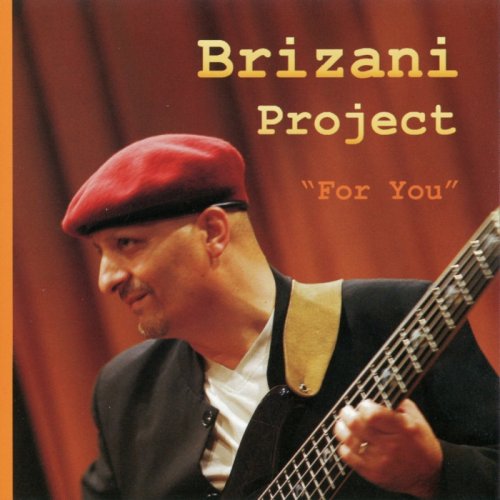
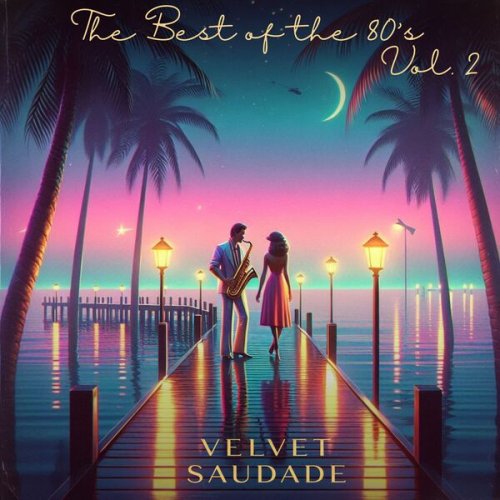
![Martin Fabricius & Chris Lavender - The Speed of Why (2010) [Hi-Res] Martin Fabricius & Chris Lavender - The Speed of Why (2010) [Hi-Res]](https://www.dibpic.com/uploads/posts/2026-02/1771254824_cover.jpg)
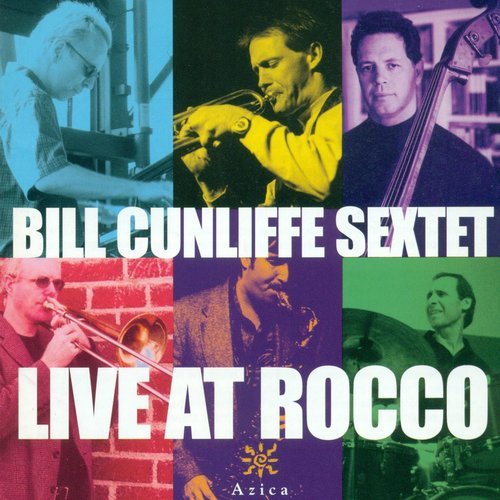
![Meg Okura - Isaiah (2026) [Hi-Res] Meg Okura - Isaiah (2026) [Hi-Res]](https://www.dibpic.com/uploads/posts/2026-02/1771428622_a0886412943_10.jpg)
![The Messthetics & James Brandon Lewis - Deface The Currency (2026) [Hi-Res] The Messthetics & James Brandon Lewis - Deface The Currency (2026) [Hi-Res]](https://www.dibpic.com/uploads/posts/2026-02/1771424652_1.jpg)
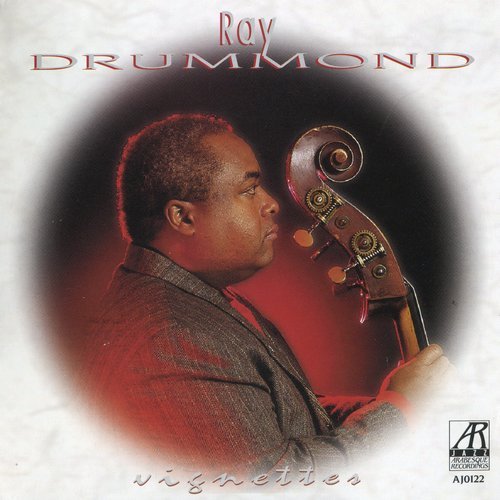

![Ali Shaheed Muhammad, Adrian Younge - Cross: Season 2 (Prime Video Original Series Soundtrack) (2026) [Hi-Res] Ali Shaheed Muhammad, Adrian Younge - Cross: Season 2 (Prime Video Original Series Soundtrack) (2026) [Hi-Res]](https://img.israbox.com/img/2026-02/18/c61izyjkl1wnuz91hzkfnam7x.jpg)